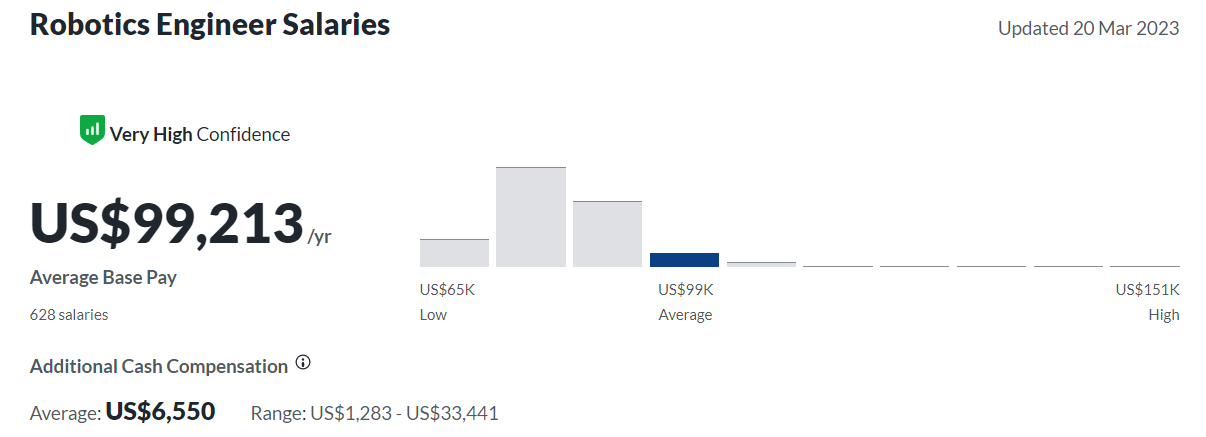
The average yearly salary for a robotics engineer in the US is $ $99,053” “Average salary at NASA's Jet Propulsion Laboratory range from $88,634 to $222,101 per year
Moonpreneur
Have you heard of Silas Adekunle? He made headlines in 2018 as the highest-paid robotics engineer. He achieved this success by creating Mekamon, the world’s first gaming robot. When he launched Mekamon, it sold 500 bots and generated $7.5 million in revenue. This success led him to be featured in the 2018 Forbes 30 Under 30 Europe: Technology list.
Wow!’
In addition to the impressive success story of Silas Adekunle, it’s worth noting the lucrative career prospects for robotics engineers.

According to Glassdoor, the average yearly salary for a robotics engineer in the US is $ $99,053, with an average additional pay of $1,259 – $35,295 from profit sharing, bonuses, or commissions.
And if we want to talk about top-paying robotics engineering jobs, we cannot overlook those at The National Aeronautics and Space Administration (NASA).
You’ll be surprised to learn that salaries for robotics engineers at NASA’s Jet Propulsion Laboratory range from $88,634 to $222,101 per year, with the average salary being $138,709 per year.
So, it’s clear that robotics engineering can be both innovative and financially rewarding.
While we’re talking about robotics engineers’ salaries, let’s take a look at the countries that pay them well.
Top five high-paying robotics job
|
Job Profile
|
Average Salary
|
|---|---|
|
Design engineer
|
$78,280/year
|
|
User interface designer
|
$79,105/per year
|
|
Mechanical engineer
|
$83,731/per year
|
|
Sales engineer
|
$84,747/per year
|
|
Robotics engineer
|
$89,872/per year
|
Top Countries for Robotics Engineers to Prosper
|
Country
|
Salary Range (per month/annum)
|
|---|---|
|
Singapore
|
SGD 4,280 - SGD 12,600
|
|
South Korea
|
₩44,500,000 - ₩80,000,000
|
|
USA
|
US$50,000 - US$185,000 per annum
|
|
China
|
¥28,000 - ¥45,000 per month
|
|
Japan
|
¥7,000,000 - ¥13,000,000
|
|
Germany
|
500,000 KR - 930,000 KR
|
|
Spain
|
€8,500 - €5,000
|
|
Denmark
|
500,000 KR - 930,000 KR
|
What does a Robotics engineer do?
The primary responsibilities of a robotics engineer include designing, building, and testing prototypes of robotic machines, as well as maintaining the software that controls them.
Not just that, they also have to research to identify the most cost-efficient and safe processes to manufacture these robotic systems.
How can one become a robotics engineer?
To become a robotics engineer, starting early can be beneficial, even from middle school. A strong foundation in math, science, and technology can better prepare you for a degree in a relevant field, such as electrical engineering, mechanical engineering, computer science, or industrial engineering.
Early exposure to robotics can also spark a passion for the field and inspire students to pursue advanced degrees or certifications, leading to a successful career as a robotics engineer.
During school, you can also participate in robotics clubs, competitions, or workshops for hands-on experience and develop critical skills such as problem-solving, teamwork, and communication.
1. After completing your school, you can earn a bachelor’s degree
Earn a relevant bachelor’s degree in electrical or mechanical engineering, computer science, or industrial engineering to gain foundational knowledge and technical skills for success in robotics.
2. Gain experience through internships
Try to get internships or co-op programs that offer hands-on experience working with robotics or related technologies.
3. Build a portfolio of projects
Work on personal or collaborative robotics-related projects to build a strong portfolio showcasing your skills and experience.
You have to start preparing early. This educational background plus experience will equip you with the foundational knowledge and technical skills necessary to excel in this dynamic and exciting field.
Robotics engineering encompasses a range of specialized areas of study. Here are some of the different streams of robotics engineering:
- Mechanical Robotics: This area of study focuses on the robot’s composition and structure, and students learn the mechanical design and construction of robots, as well as their components and systems.
- Electrical Robotics: A fascinating branch of robotics, it provides valuable insights into the programming, control systems, and power electronics that drive robots. The curriculum covers the electrical systems that power robots, including their power supplies, motors, and sensors.
- Control Robotics: The system that contributes to the movement of robots is known as robotic control. Here you will learn to develop algorithms and control systems to operate and manage the movements and actions of robots.
- Computer Science Robotics: Computer Science Robotics is the specialized field of robotics engineering that focuses on developing software programs and interfaces for robots that enables robots to interact with their environments and perform complex tasks.
- Cognitive Robotics: An emerging field, Cognitive Robotics is a specialized field of robotics engineering that focuses on developing robots with advanced capabilities that simulate human cognition, reasoning, and decision-making processes.
- Bio-inspired Robotics: Here, the focus is on designing and building robots modeled after biological systems, such as animals or humans.
- Marine Robotics: Those who study marine robotics design and develop robots capable of operating in and exploring the underwater environment. These robots may be used for various purposes, such as oceanographic research, environmental monitoring, offshore oil and gas exploration, and underwater inspection and maintenance.
- Aerospace Robotics: If we need robots for underwater, we also need robots for space. Robotics engineering that focuses on designing, building, and operating robots and robotic systems that can operate in space or other extreme environments, such as high-altitude flight or planetary exploration, is called
- Aerospace Robotics. These robots may be used for various purposes, including scientific research, satellite servicing, and space exploration.
With the rapid growth of technology and increasing demand for skilled professionals, robotics engineers will play a critical role in shaping the future of automation, robotics, and AI-driven systems across various industries.
Moonpreneur understands the needs and demands this rapidly changing technological world is bringing with it for our kids. Thus we are on a mission to educate and ignite the flames of entrepreneurship through our holistically created online STEM programs, which will help kids master the futuristic sciences such as Robotics, Game Development, App Development, Advanced Math, and much more!!
Register for a free 60-minute Robotics Workshop today!

















What factors could affect the salary of a robotics engineer in 2023?
In 2023, the salary of a robotics engineer may vary depending on a variety of elements, such as experience, education, qualifications, sector, and geographical location.
Generally, higher salaries are associated with experience, post-graduate qualifications, and proficiency in Computer Vision, Machine Learning, and Artificial Intelligence. Higher wages are available in industries such as Healthcare and Aeronautics. The higher cost of living in major cities makes it more appealing to work in these industries. Additionally, performance, the size of the business, and the economic climate may influence pay.
What do robotic engineers at NASA make?
Robotics engineers at the NASA Jet Propulsion Laboratory typically earn $95,820 annually. At NASA Jet Propulsion Laboratory, robotics engineers can earn between $62,760 and $1,46,293 a year.
After five years, how much do robotics engineers make?
US robotics engineers’ typical wages after five years of work, broken down by industry:
$125,000 for technology$122,000 for health careProducing: $115,000Price: $110,000It’s crucial to remember that these are averages and that earnings might vary widely across individuals. These averages may not be met by everyone.